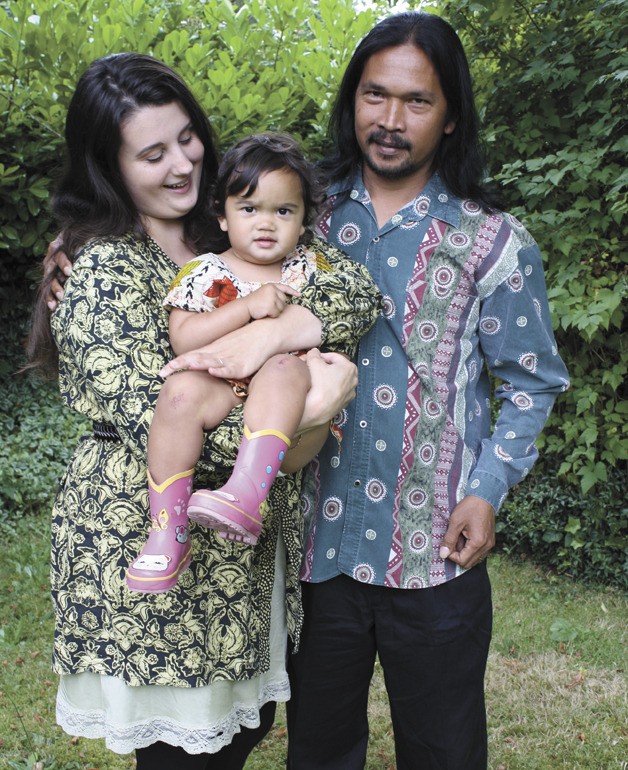Two talented Vashon musicians are asking Islanders to help with their new artistic venture — a musical performance that will cross cultural divides, musical boundaries and historical taboos to tell the story of a once-persecuted group of women in Indonesia.
The project, dubbed “Wanitani: Songs for the Women of Gerwani,” is the brainchild of Krusnedi Sukarwanto and Maegen O’Donoghue-Williams Sukarwanto, a husband-and-wife team that performs traditional and experimental Javanese music in a duo called Orkes Manohara.
They are now attempting to raise $7,500 through the website Kickstarter.com — funds that will enable them to travel to Java, research and compose music and then return to the United States to present their finished piece to audiences throughout the Pacific Northwest.
The musical, as the pair envisions it, will have a sweeping and serious theme. With songs and a multi-media presentation, the new piece will be the first-ever artistic exploration of Gerwani, a women’s rights organization in Indonesia whose members endured imprisonment, torture and even death for their beliefs during a Communist purge that happened under the reign of Suharto, Indonesia’s brutal dictator. Suharto’s rule in the country ended with his resignation in 1998.
“The story is tragic but extremely inspiring,” said Maegen, as she sat nursing her 18-month old daughter Sohna in the couple’s Vashon home — a sparsely furnished, batik-adorned rental that seems to be a place where her American sensibilities have melded artfully with those of her Indonesian husband.
“Our initial interest in the project comes from our belief that forbidden subjects hold a lot of value in the context of art and music,” Krusnedi said in a mixture of Javanese and Indonesian that his wife translated. “A lot of the music we want to include in this story was actually banned and censored in Indonesia.”
The couple is eager to return to Java to interview the few elderly surviving members of the group — women Maegen describes as “the most beautiful, calm, refined women you could ever imagine” — who still live in a home for former political prisoners of war.
Maegen and Krusnedi both said that although the group is no longer persecuted, their plight is still considered a taboo subject in Indonesia. They also said they’d received several anonymous e-mail warnings not to pursue their project — threats they are clearly ignoring.
The trip will be not only be a difficult artistic undertaking but also a homecoming.
Krusnedi, 47, is acclaimed throughout Java as a cellist, composer and performer of keroncong music — a traditional form of folk music that combines stringed instruments, flute and vocals. He is also known for his interpretations of pop, gamelan and experimental music.
Maegen, 27, is a native Los Angelean who became fascinated by the ancient art of gamelan — a gong and chime orchestra — while attending music school at Cornish College of the Arts in Seattle. When she traveled to Indonesia in 2008 to expand her studies in singing Javanese music, she met Krusnedi on her third day in the country.
The pair began to perform together almost immediately, and within a year, they had fallen in love and were married in a traditional Javanese ceremony.
But a difficult pregnancy prompted the couple to move to the United States and eventually to Vashon.
“I got dengue fever when I was pregnant,” Maegan said. “I didn’t feel very strong and I really wanted the comfort of my own culture.”
Now healthy, Maegen admits the move to Vashon — a place where she and her husband landed because they have friends on the Island — has been an adjustment.
“My husband is used to having people scream when he walks onstage,” said Maegen. “Here, we almost have to beg for people to let us play.”
Still, the couple is becoming increasingly well known in the Northwest and has performed in several Seattle venues. Last year, many Islanders heard them for the first time when they performed a concert at David Smith’s intricately carved Javanese house on Vashon. To make ends meet, Maegen also works as a barista at Minglement, and Krusnedi does some landscaping work.
On Vashon, they have also found plenty of peaceful time to devote to their bubbly young daughter, whose toddler talk is an enchanting blend of Indonesian, Javanese and English words.
But music is clearly the couple’s passion, and they are eager to return to Java with Sohna in their arms and dive into the creative work of “Wanitani: Songs for the Women of Gerwani.”
“We feel like it would be meaningful for Vashon people to appreciate these women, to know what they have been through and be interested in their lives,” Maegen said.
Islanders can donate to the Gerwani project though Sept. 3 by visiting www.kickstarter.com and searching for “Wanitani: Songs for the Women of Gerwani.” For more information, visit www.orkesmanohara.com and the blog, orkesmanohara.blogspot.com.


